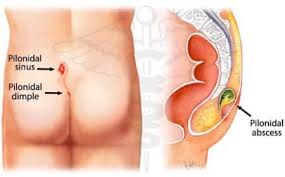



A pilonidal sinus (PNS) is a small hole or tunnel in the skin. It may fill with fluid or pus, causing the formation of a cyst or abscess. It occurs in the cleft at the top of the buttocks. A pilonidal cyst usually contains hair, dirt, and debris. It can cause severe pain and can often become infected. If it becomes infected, it may ooze pus and blood and have a foul odor.
A PNS is a condition that mostly affects men and is also common in young adults. It’s also more common in people who sit a lot, like cab drivers.
Hepatobiliary and pancreatic surgery can be performed using minimally invasive techniques. Some common procedures include:
The exact cause of this condition isn’t known, but its cause is believed to be a combination of changing hormones (because it occurs after puberty), hair growth, and friction from clothes or from spending a long time sitting.
Activities that cause friction, like sitting, can force the hair growing in the area to burrow back under the skin. The body considers this hair foreign and launches an immune response against it, similar to how it would react when dealing with a splinter. This immune response forms the cyst around your hair. Sometimes a person may have multiple sinuses that connect under the skin.
Identifying a pilonidal sinus and recognizing signs of infection
You may not have any noticeable symptoms at first other than a small, dimple-like depression on the surface of your skin. However, once the depression becomes infected, it will quickly develop into a cyst (a closed sac filled with fluid) or an abscess (a swollen and inflamed tissue where pus collects).
If you have a recurring PNS or if you have more than one sinus tract, your doctor will recommend a surgical procedure.
The surgeon will open the lesions, removing all of the pus and debris. Once this process is complete, the surgeon will stitch the wounds closed.
After surgery, your doctor will explain how to change the dressings and will recommend shaving the site to prevent hair from growing into the wound.
Depending on the severity of the disorder and the type of treatment, a PNS will usually clear up within 4 to 10 weeks.
There are a number of complications that may arise from PNS. These include wound infection and a recurrence of the PNS even after surgery.
You can prevent recurrence of PNS by washing the area on a daily basis with a mild soap, making sure all soap is removed, keeping the area completely dry, and avoiding sitting for long periods.